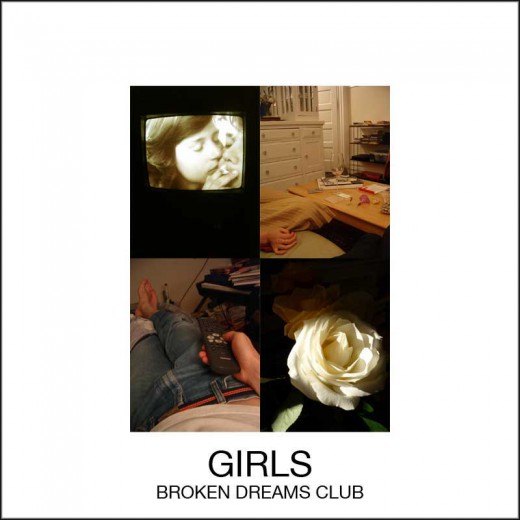This year, The Vaselines released the song “I Hate The 80’s” on their album Sex With An X, which dealt with what the band sees as “nostalgia for the decade,” in which most of the nostalgic were barely alive to experience. Years back, Craig Finn took a similar stance in “Positive Jam,” saying “the ’80s almost killed me, let’s not recall them quite so fondly,” and in the first LCD Soundsystem single, James Murphy referred to the phenomenon as “borrowed nostalgia for the unremembered ’80s.” Those last lyrics were written nearly a decade ago, making The Vaselines a little late on their criticism, but though the ’80s nostalgia that appeared with the rise of dance punk continues still with artists as diverse as Wild Nothing, The Pains of Being Pure at Heart, Toro Y Moi and Ariel Pink’s Haunted Graffiti, it is also important to remember that nostalgia from other times exists in the same spotlight, but without the fervent opposition that the ’80s gets.
Girls is one who finds their nostalgia from older and theoretically simpler times. But where technology was undoubtedly complicated people’s lives, just as confusing and dangerous were Vietnam and civil rights, replacing the Middle East and global warming as issues to fight for, or happily ignore. Christopher Owens, who formed the band with bassist/producer J.R. White, grew up in the ’80s like the rest of the musicians in their twenties right now, but his childhood didn’t exist with the same frame of reference as most due to his much publicized membership to the Children of God cult and their forbidding of popular music into the home. But he was allowed to watch movies and these served as his introduction to pop and rock, and so his gravitation towards the oldies is virtually the same as the ’80s nostalgia that is so common many contemporary artists.
“Thee Oh So Protective One” begins Girls’ Broken Dreams Club with a horn section that could be backup to Elvis Costello or The Supremes, but once the singing begins with the optimistic and tormented lyrics that characterize Owens’ craft, it becomes unmistakably his own aesthetic, which is impressive after just two releases. Though he can be likened to a number of classic singers, some of the all-time greats might I add, his work is his own and ultimately original in its identity.
Broken Dreams Club includes a letter to fans of the band, written in cursive that is nearly illegible. Speaking as a person with awful handwriting, dude should have typed it or at least printed it. But the parts that I can understand place this mini-album as a “letter of intent, a snapshot of the horizon.” And this is where we get a captivating piece, because as lost in the past the music can seem, the music is equally pushing forward to the future. “Carolina” features an intro of swirling psychedelia, from extended slide guitar plucks to the faint snares and toms that sound like they were in a dream from a week ago, present and removed at the same time. When the song kicks in, the static in the recording doesn’t sound vintage; rather, it sounds like a noise-rock take on classic rock.
And then the chorus hits and it becomes Brian Wilson. It’s a journey of a song, full of memorable episodes, but none more dramatic as when the music drops away and Owens is left to continue the chorus by himself. The band returns with more force shortly thereafter, but we remember that Owens at the mic and White behind the knobs are running this show. Speaking of the production, “Carolina” is a wonderful song from Owens, but it is a masterpiece of recording. White has always balanced taste and ambition perfectly, and here he hits a new high water mark, with all the subtlety required to make the song work as both a nostalgic throwback and progressive artistic statement.
So what does this roadmap say of the two young artists? Well “Substances” worrisome lyrics play with the double meaning of the term; the substances we abuse and substance as something tangible. Owens notes that it is easier to take substances then to face the substantial reality. It is a major theme of some of the best contemporary art, from Infinite Jest to The Corrections, and maybe the answer isn’t the one we all assume to be true. Maybe the world is impossible to experience as a free thinker and creative individual without medication. Is the only other alternative to give up your dreams and passions and accept mediocrity? And are these the “broken dreams” that Owens refers to in the title?
So when The Vaselines criticize ’80s nostalgia, they really miss the point. It is not the time period that these young artists yearn for, it is innocence and youth and a time before dreams were abandoned, before planes hit the world trade center and before the internet removed the mysteries of life and before the planet was rapidly destroying itself without care and before artists were given the reality that their art will be devalued to the point that struggle will always be associated with what you do. On the title track, Owens asks “if you know something I don’t, come on and help me out,” his question being how people survive when all their dreams were left with the children they used to be. I wonder that too. But if the only solutions are medicating or joining the broken dreams club, then I guess I’m with Owens.


